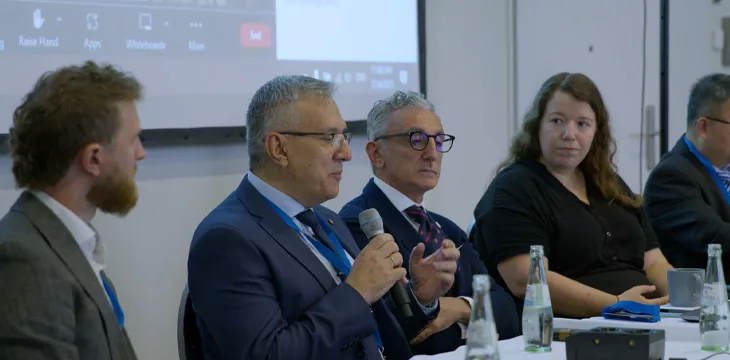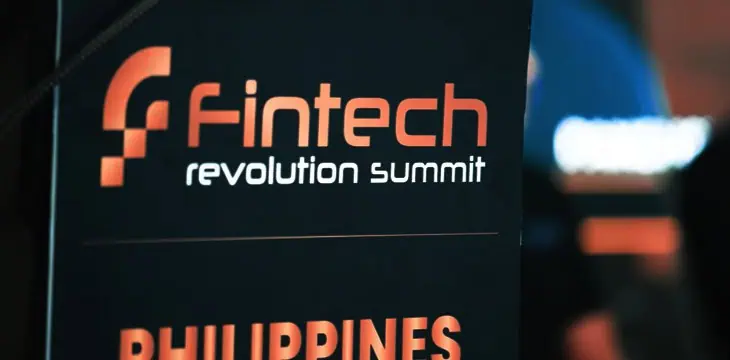|
Getting your Trinity Audio player ready...
|
IEEE COINS, which stands for “Institute of Electrical and Electronics Engineers” (IEEE) “Conference on Omni-Layer Intelligent Systems” (COINS), took place on July 23-25 at the Mercure Moa in Berlin. The event gathered local academics interested in groundbreaking technologies such as the Internet of Things (IoT), artificial intelligence (AI), and Big Data, with several sessions dedicated to where blockchain fits in.
“This event is being co-organized by me and a few of my colleagues at nChain, and we felt that this conference was a really good one for us because it’s the intersection of several emerging technologies,” shared nChain‘s Owen Vaughan, Ph.D., Chief Licensing Science Officer.
“So [the event has] a focus on blockchain, AI, IoT, IPv6, and how all of those different technologies talk to each other. It’s been a really productive day,” he added.
One of the speakers nChain invited to attend IEEE COINS was Konstantinos Sgantzos, AI and blockchain researcher and lecturer at the University of Sharjah, in the United Arab Emirates (UAE). Sgantzos is renowned for his expertise in the intersection of AI and blockchain tech.
“These conferences have this unique capability of gathering the smartest people around. So we need to persuade first those people so that they can convince everybody else,” he told CoinGeek.
“It is really a pleasure being here and being invited to this event. We had the opportunity to present our latest work and a couple of ideas that we have,” Sgantzos confirmed.
Founder and President of the IPv6 Forum and an active partner of IEEE events Latif Ladid delivered the keynote speech and spoke highly of nChain’s involvement at IEEE COINS.
“Here there were about 215 papers submitted, of which they have selected just 62, which is a very stiff selection system, and two of them are from nChain, which is quite amazing,” Ladid shared.
“And on top of that, we have a blockchain industrial session demystifying blockchain, AI and setting a very cool how you go about it and how you picture the roadmap for these things without falling into these extremes that we see today, so blockchain has to be purified as such. It is good for mankind,” Ladid added.
Representing nChain alongside Vaughan was Research Director Michaella Pettit, a panelist on both the Blockchain session and the Diversity and Inclusion session.
“Data integrity is something that we’ve never had before blockchain. Blockchain is the first system that really enables us to have a secure, immutable storage system,” she explained.
“I think with all these different technologies that we’re talking about- AI, IoT, IPv6—they all rely on this data integrity system, and it really helps those technologies as well as them helping blockchain,” Pettit said.
Sgantzos also spoke on the importance of data integrity, especially when it comes to fostering a robust future for AI.
“I definitely think that the intersection with and fusion with blockchain is going to be really interesting on how we can advance this AI technology for the whole world,” Sgantzos shared.
“One of the main keys in this venture is to actually gather the best data that we can, and we need to have the absolute truth of the data set, and the data needs also to be—apart from accurate—highly diverse,” he confirmed.
Zeming M. Gao of Toolots Inc. and author of the thought-provoking posts at the ZemGao.com blog provided his perspective on the importance of data integrity and AI during the blockchain panel and with CoinGeek.
“Today’s database itself, standing alone, can be very efficient, reliable, but they don’t connect with each other very efficiently. You really need a single source of truth, and that requires a very scalable public blockchain,” he explained.
“When you don’t have a proper kind of data structure, and you allow AI to do its own thing and gradually it’s going to lose coherency, and you have the maximized entropy, the system is going to be in trouble,” Gao said.
Providing the enterprise-level perspective on blockchain and AI, Giovanni Franzese, executive partner at nChain, spoke on the blockchain panel and shared anecdotes from his days leading the blockchain tech movement at Ericsson.
“AI will be another key technology to combine with the blockchain and we will see the wonderful things that those two technologies will manage to expose very shortly because AI needs a blockchain,” he said.
“AI is trained on data. Now, who will secure that this data is trustful, or who will secure that this data is not manipulated? So that’s why AI needs blockchain in order to keep safe the data, to keep the traceability and the immutability of data which only blockchain can provide,” Franzese said.
Micropayments are also something that only blockchain (a scalable one) can provide, tying together all of the technologies discussed on the IEEE COINS blockchain panel. For AI to function properly, we need a high volume of people to get involved and provide accurate data, something that can be incentivized by micropayments.
“If we imagine in the not-so-far future that we have a lot of devices gathered around the world and each device has an IP version six, which is infused with blockchain technology, then every transaction will be recorded on chain. And those data are really gold for machine learning. And this is basically the whole idea,” Sgantzos revealed.
In summary, having ownership of our data and sharing it with the appropriate parties via blockchain tech will make everything more efficient (not scary!) in a digital world with the use of AI.
“I think in the future AI will be doing digital labor and which we don’t want to do, but people can actually have their own sovereignty,” explained Gao.
“We become the input to the system. So the system eventually is not only efficient, but it continues to be alive, not reaching the maximum entropy of the thermodynamic system, which is death. Blockchain is our hope,” he said.
Watch: Blockchain can bring accountability to AI

 07-09-2025
07-09-2025 





